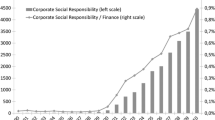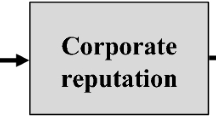Abstract
Recent research in accounting explores how firms use “individual” or “non-financial” measures of performance in executive compensation contracts. We model a firm that conditions bonus payments to executives on information that is not available to those outside the firm. This raises two issues. First, market participants may use the magnitude of such payments to infer the non-public information. Second, because information that is non-public is, by extension, non-verifiable, the firm cannot write explicit contracts based on it. Combining the relational incentive contracts and financial signaling literatures, we examine equilibria of a signaling game in which bonus payments from a firm to a manager convey non-public information regarding the firm’s future cash flows. Our main result is that increases in corporate myopia can, under some conditions, lead to increased profits. This finding is contrary to that typically found in financial signaling models.
Similar content being viewed by others
References
S. Baiman R. E. Verrecchia. (1996) ArticleTitleThe Relation Among Capital Markets, Financial Disclosure, Production Efficiency, and Insider Trading Journal of Accounting Research 24 1–22
G. Baker R. Gibbons K. J. Murphy. (1994) ArticleTitleSubjective Performance Measures in Optimal Incentive Contracts Quarterly Journal of Economics 109 1125–1156
S. Bhattacharya (1979) ArticleTitleImperfect Information, Dividend Policy, and ‘the Bird in the Hand’ Fallacy Bell Journal of Economics 10 233–244
R. A. Brealey S. C. Myers (2003) Principles of Corporate Finance McGraw-Hill New York
C. Bull (1987) ArticleTitleThe Existence of Self-Enforcing Implicit Contracts Quarterly Journal of Economics 102 147–160
R. M. Bushman R. J. Indjejikian A. Smith. (1996) ArticleTitleCEO Compensation: The Role of Individual Performance Evaluation Journal of Accounting and Economics 21 161–193 Occurrence Handle10.1016/0165-4101(95)00416-5
I.-K. Cho D. Kreps. (1987) ArticleTitleSignaling Games and Stable Equilibria Quarterly Journal of Economics 102 179–221
J. Fellingham P. Newman Y. Suh. (1985) ArticleTitleContracts Without Memory in Multiperiod Agency Journal of Economic Theory 37 340–355 Occurrence Handle10.1016/0022-0531(85)90095-X
D. Fudenberg J. Tirole (1995) Game Theory MIT Press Cambridge
R. M. Hayes S. Schaefer. (2000) ArticleTitleImplicit Contracts and the Explanatory Power of Top Executive Compensation for Future Performance RAND Journal of Economics 31 273–293
B. Holmstrom J. Tirole. (1993) ArticleTitleMarket Liquidity and Performance Monitoring Journal of Political Economy 101 678–709 Occurrence Handle10.1086/261893
C. D. Ittner D. F. Larcker M. V. Rajan. (1997) ArticleTitleThe Choice of Performance Measures in Annual Bonus Contracts Accounting Review 72 231–255
C. Kanodia D. Lee. (1998) ArticleTitleInvestment and Disclosure: The Disciplinary Role of Periodic Performance Reports Journal of Accounting Research 36 33–55
H. Leland D. Pyle. (1977) ArticleTitleInformational Asymmetries, Financial Structure and Financial Intermediation Journal of Finance 32 371–387
J. Levin (2003) ArticleTitleRelational Incentive Contracts American Economic Review 93 835–857 Occurrence Handle10.1257/000282803322157115
W. B. MacLeod (2003) ArticleTitleOptimal Contracting with Subjective Evaluation American Economic Review 93 216–240 Occurrence Handle10.1257/000282803321455232
M. H. Miller K. Rock. (1985) ArticleTitleDividend Policy Under Asymmetric Information Journal of Finance 40 1031–1051
K. J Murphy (1999) Executive Compensation Orley Ashenfelter David Card (Eds) Handbook of Labor Economics NumberInSeriesVol. 3. North-Holland Amsterdam
S. A. Ross (1977) ArticleTitleThe Determination of Financial Structure: The Incentive-Signaling Approach Bell Journal of Economics 8 23–40
J. C. Stein (1988) ArticleTitleTakeover Threats and Managerial Myopia Journal of Political Economy 96 61–80 Occurrence Handle10.1086/261524
J. C. Stein (1989) ArticleTitleEfficient Capital Markets, Inefficient Firms: A model of myopic corporate behavior Quarterly Journal of Economics 104 655–669
Author information
Authors and Affiliations
Corresponding author
Rights and permissions
About this article
Cite this article
Hayes, R.M., Schaefer, S. Bonuses and Non-Public Information in Publicly Traded Firms. Rev Acc Stud 10, 431–464 (2005). https://doi.org/10.1007/s11142-005-4209-2
Issue Date:
DOI: https://doi.org/10.1007/s11142-005-4209-2




